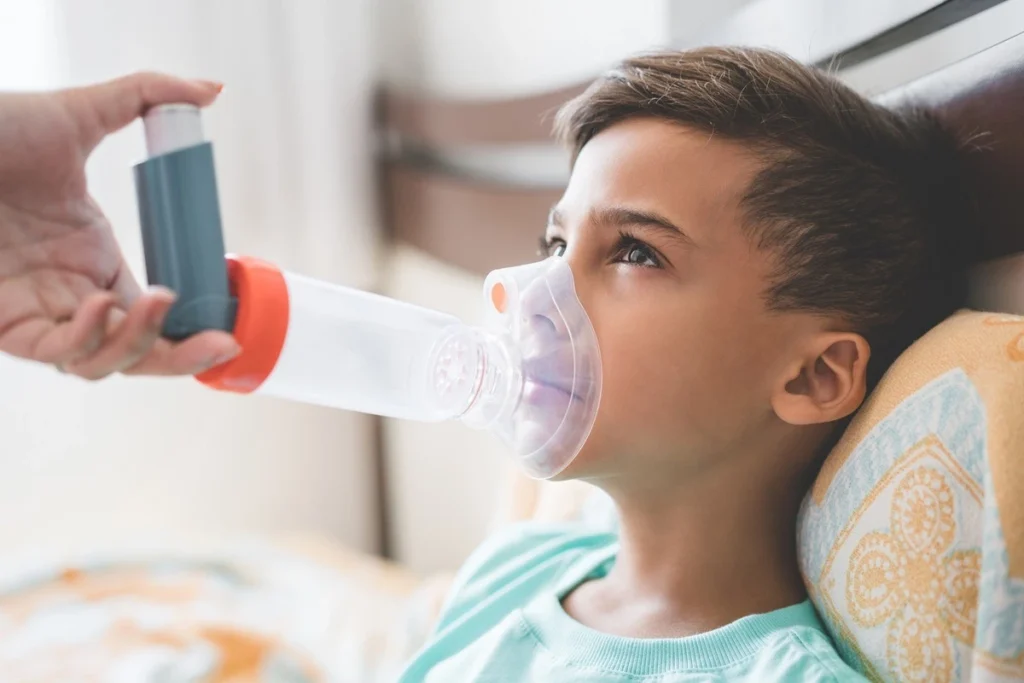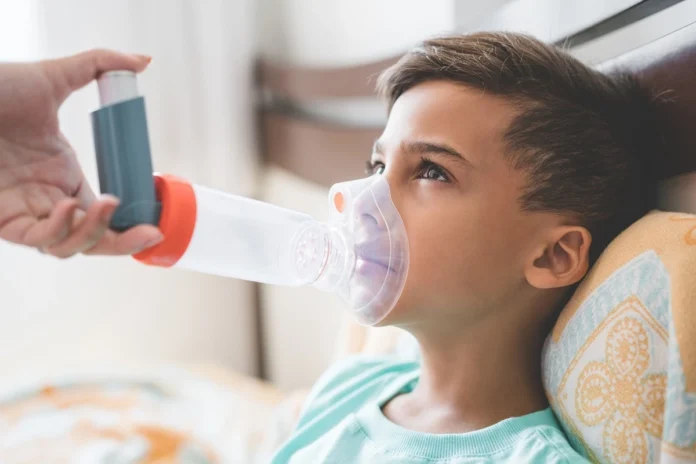Asthma: Triggers, Signs Figuring It Out, and Handling It. Swelling and squeezing of breathing passages mark asthma sparking repeated bouts of wheezing, running out of breath, a squeezing feeling in the chest, and a persistent cough. While good treatments often control it well, the harsh cases might pose a real danger to life. We dive into the reasons behind asthma how it shows up how you figure out if someone has it, and ways to deal with it.

Understanding Asthma
Asthma’s a chronic illness that messes with your lungs sparking inflammation in the airways and making them super reactive to some stuff. Swollen airways too much mucus, and tight muscles make sucking in air a real pain. Asthma flare-ups can hit you fast and hard, and trust me, they’re no joke in how bad they can get. I dug up on Wikipedia, and it says anyone can get asthma, kiddos and grown-ups alike, but it often kicks off when you’re just a little tyke.
Talking about why people get asthma, it’s kind of a mystery, but it’s like a tag team of your body’s blueprint and the world around you playing a part. Here’s the lowdown on the main things that make you more likely to get it:
- Genetics: Having family members with asthma makes you more likely to get it yourself.
- Allergens: Things like dust mites, pollen, pets’ skin flakes, mold, and cockroach waste can start asthma trouble.
- Respiratory Infections: Catching a viral infection when you’re small might make you develop asthma when you’re older.
- Air Pollution: Being around smoke, gases, and stuff from factories can make it more likely you’ll have asthma.
- Exercise-Induced Asthma: Working out in chilly air, can make some people’s asthma act up.
- Work Irritants and Asthma: Exposure to stuff like chemicals, dust, or smoke at work might cause grown-ups to get asthma.
- Being Overweight and Asthma: Research shows being overweight might up the chances of getting asthma.
Symptoms of Asthma
People with asthma don’t all have the same experience. Some common things they deal with are:
- Shortness of breath: It gets tough to breathe, a lot when you hustle or in the wee hours.
- Chest tightness or pain: Feels like someone’s squeezing your chest real tight.
- Wheezing: You hear a high-pitched noise when you let out a breath.
- Coughing: You just can’t stop coughing, and it’s worse when you hit the sack or wake up.
- Sleep problems: All that coughing and funny noises make it hard to catch some Z’s.
Symptoms can often get worse due to different triggers which we call an asthma episode.
Causes and Triggers
No one really knows why asthma happens, but it comes from both genes and stuff in the environment. Things that set off asthma are:
- Pollen and Stuff: Things floating around like pollen, dust mites, mold floating around, animals shedding, or pieces of roach junk.
- Getting Sick: Catching stuff like a cold or the flu, which can make it harder to breathe for someone with asthma.
- Getting Your Sweat On: Sometimes when folks exercise or after, they start wheezing and stuff ’cause of asthma.
- Chilly Air: When someone with asthma breathes in cold, not wet air, it can kick off their wheezing.
- Nasty Air: Breathing in bad stuff like smoke real strong smells, and harsh chemicals can tick off the tubes you breathe through.
- Some Medicine: There are these meds, right, like beta-blockers, aspirin, and them anti-swelling pills, that can set off an asthma attack. When you get stressed out or deal with heavy emotions, you might start breathing way too fast. This hyperventilation thing can kick off your asthma and make you feel all wheezy and stuff.
Managing asthma means knowing and staying away from stuff that gets your asthma going.
We’ve got different kinds of asthma, and they’re sorted by what sets them off and how bad they get:
- Allergic Asthma happens when stuff like pollen, dust, or furry pets bother you.
- Non-Allergic Asthma pops up because of things like stress chilly air, or getting sick with something else.
- Exercise-Induced Asthma shows up when you’re getting your sweat on or right after.
- Occupational Asthma kicks in when you’re around nasty substances at work.
- Severe Asthma sticks around way more and is trickier to get under control.
Doctors use lung function exams, body checks, and health backgrounds to spot asthma. Typical tests they run are:
- Spirometry inspects how much air moves through the lungs.
- Peak Flow Test checks the speed of your breath out.
- Methacholine Challenge Test looks at how touchy your air pipes are.
- Allergy Testing finds stuff you might be allergic to.
- Imaging Tests like Chest X-rays or CT scans help cross off other possible health issues.
Complications
If you don’t keep your asthma in check, you might have to deal with problems like:
- Signs that happen a lot: They mess with your sleep and make you less productive
- Breathing capacity gets worse: Constant swelling might lead to always narrow airways.
- Needing the emergency room: bad asthma flare-ups need quick doctor help.
- Nasty reactions to drugs: If you use asthma meds for a long time, they might give you problems.
Dealing with asthma the right way is key to stopping these bad outcomes.
Dealing with Asthma and How to Treat It
Asthma’s not something you can get rid of, but you can keep it under control with the right habits and meds. Here’s what you can do for treatment:
Drugs for Asthma
- Quick-Relief Inhalers (Rescue Inhalers): Bronchodilators in these give fast help when you’re having an asthma attack.
- Long-Term Control Medications: You got inhaled corticosteroids, leukotriene modifiers, and beta-agonists working to keep symptoms away.
- Biologic Therapies: They’re for the tough cases of asthma and go after certain immune system stuff.
- Oral Medications: Docs might tell you to take these if your asthma doesn’t chill out.
Lifestyle Changes
- Dodge the Bad Stuff: Spot and cut down on stuff that bugs you or gives you allergies.
- Eat Good to Feel Good: Chowing down on lots of fruits, veggies, and stuff that fights swelling might help chill out those symptoms.
- Get Moving, But Not Too Crazy: Tough workouts can mess with your asthma, but chill exercises can make your lungs work better.
- Air Cleaners to the Rescue: They help you say bye to indoor dust and sniffle-causers.
- Kick Stress Out: Bend and breathe in yoga or zone out in meditation to keep asthma freak-outs at bay.
What to Do About Asthma
Asthma fix-ups zoom in on keeping it steady and stepping in fast when you need it:
- To prevent symptoms and reduce swelling in the airways, folks use long-term control meds like inhaled corticosteroids, stuff that modifies leukotrienes, and meds that keep the airways open for a while.
- When an asthma attack hits fast-acting meds like albuterol are real lifesavers. They work quick to chill out the muscles in your airways.
New research has weighed the benefits of various instant relief meds. Take, for example, levalbuterol next to albuterol. They’re both quick-acting meds for asthma that make breathing way easier by opening up the airways. Levalbuterol, which folks also call (R)-albuterol, is seen as the go-getter form and might not cause as many unwanted effects as the (R)- and (S)-albuterol combo found in albuterol. But hey, evidence says both do a pretty solid job at keeping asthma troubles in check.
Preventive Actions
Jumping on things can cut down on asthma problems. Here’s some top-notch ways to stop the wheeze before it starts:
- Preventing Infections: Taking shots for flu and pneumonia to stop respiratory problems.
- Following Medicine Rules: Sticking with the doctor’s orders for medications.
- Tracking Symptoms: Using an asthma diary to note triggers and signs.
- Seeing the Doctor: Going to regular check-ups to manage asthma .
- Quitting Smoking: Staying away from smoking and others who smoke.
Time to Get Help
Asthma flare-ups might be super serious. If they happen, you gotta rush to get emergency help:
- Breathing gets super hard.
- The emergency puffers don’t do anything to help.
- When someone’s lips or nails go a shade of blue.
- There’s muddling up or feeling mega sleepy ’cause there’s not enough oxygen getting in.
Conclusion
Asthma’s a long-term lung thing that anyone can get, young or old. Figuring out what kicks it off, the signs to look out for, and what you could do about it means people can keep it in check and have a better day-to-day. Spotting it and handling it right stops the bad stuff from happening.

